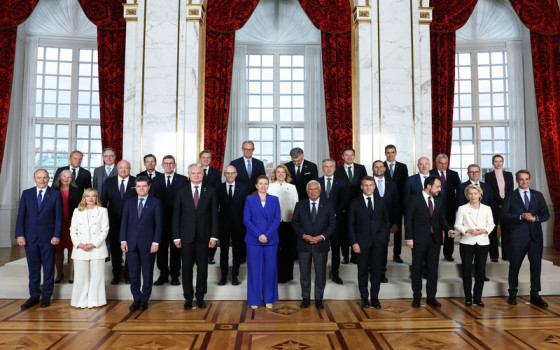
EU President at the end of the Copenhagen summit: The main topic: Protecting the security of our continent, as citizens are justifiably concerned about Russia's increasingly provocative and reckless behavior

- Europe and Arabs
- Thursday , 2 October 2025 9:39 AM GMT
Brussels - Copenhagen: Europe and the Arabs
European Council President António Costa said at the conclusion of the Copenhagen summit of member states' leaders that the main topic of discussion was the issue of protecting the security of the European continent. He added in a statement distributed in Brussels on Wednesday evening, "European citizens are justifiably concerned about Russia's increasingly provocative and reckless behavior. When Denmark, Poland, or Estonia face incursions into their airspace, they are protecting our common borders and territory, the borders and territory of the European Union. We fully support them because we are committed to confronting common threats together, on all fronts, whether conventional, hybrid, or cyber, with a common goal. In fact, this goal has been clear since the beginning of Russia's war in Ukraine. This goal has a specific name: Building a Defensive Europe.
Over the past three years, European allies have significantly increased their defense spending. Earlier this year, they agreed to further increase their spending targets. To support this effort, At the European level, we established the SAFE mechanism, worth €150 billion.
In March, European leaders agreed on the priority capabilities that our work should focus on for the security of all Europeans: air and missile defense, artillery, drones and counter-drone systems, military mobility, cyber resilience, and others.
Today, we have taken it a step further. I welcome the paper presented by European Commission President Ursula von der Leyen and High Representative Kaya Kallas. Leaders broadly endorsed key initial priority projects that will strengthen Europe's security, including the European drone wall and surveillance of our eastern flank. This is a fundamental step on our path to achieving common defense readiness by 2030. It reflects the acute threat currently posed to our eastern flank. At the same time, it is clear that Europe's borders will only be secure if all of Europe's borders are secure, through a comprehensive approach.
To build a defensive Europe, we need effective political oversight and coordination to monitor our progress. Our defense ministers must play a greater role—to drive the work forward. Between European Council meetings and tracking progress.
Turning to our discussions on Ukraine, since February 24, 2022, the European Union has stood firmly by Ukraine, and we are engaged on all fronts to achieve a just and lasting peace there. A new package of sanctions is on the table, targeting oil revenues, banks, cryptocurrencies, and the shadow fleet.
We are also paving the way for Ukraine's EU membership. Ukraine has consistently met its EU accession commitments, and the Commission has recognized this. Now it is the EU's turn to deliver, because enlargement is a merit-based process and because it will strengthen Europe.
Finally, on financing, European leaders today held a preliminary discussion on how to mobilize more funds for Ukraine. The message is clear: Russia must recognize that Ukraine's partners, including its European partners, have the will and the means to continue supporting it until a just and lasting peace is achieved.
This is the focus of today's informal meeting—preparing decisions related to the security of our continent: decisions on a defensive Europe; and decisions to strengthen support for Ukraine. In two weeks, the Commission will present The European Roadmap for Defense Readiness to 2030 will be discussed, and the European Council will meet again in three weeks—and that will be the time to make decisions.
Thank you to Copenhagen for giving us this opportunity, in this informal European Council, to prepare for our next decisions.












No Comments Found